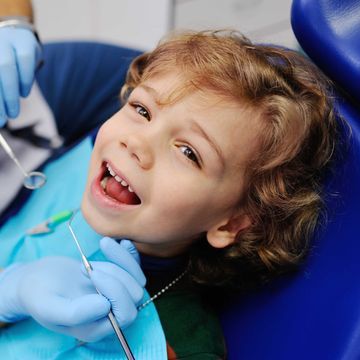CHILDREN IN THE PRACTICE
Cabinet Dentaire de Rumine prioritises managing nerves and anxiety

Dental care for kids with soothing words
When we welcome children to our practice, we aim to really educate them.
Education spans different disciplines through various methods, actions and attitudes. Play introduces an element of mutual trust that has helped us provide care in the chair for several children who were destined for general anaesthesia for their dental treatment. This educational approach applies across the board to matters such as weaning off a dummy, orthodontic check-ups, explaining confusing phenomena to parents and children, dental sealants and providing information on conditions that are transmissible through saliva.
To achieve this standard of care, managing nerves and anxiety in our young patients is at the forefront of our considerations. We bring our expertise to bear from the first appointment, as the very first treatments are wheredental phobia may rear its head. Hypnosis is among the tools we may use for this purpose. Dr Cohen Adad is a certified hypnosis practitioner recognised by the National Guild of Hypnotists (NGH).
When treating children, we spend as much time diagnosing cavities as we do on prevention of oral-health conditions and preventative dental care. We also monitor how your child’s teeth are developing from an orthodontic perspective and will refer them to specialists in our network of trusted partners, if need be.
Adapting care for young patients to each individual child is crucial – just like we do for adults. This depends on their fears, their level of understanding of what’s going on around them and the right feeling in the relationship between the child and the practitioner.
We want to create a long-term trusting relationship with you and your child, which will be crucial in choosing and performing treatments, even before we get into practical tips and techniques designed for younger patients. We do everything within our power to ensure your child’s experience of our practice is fun, constructive and positive.
This is what is required for peaceful visits to the dentist and it cannot be done without your active support. Particularly in the way that you raise the prospect of your child’s first visit to the dentist when you’re at home.
You can help boost their confidence and make their first encounter with a dentist easier using suitable vocabulary suggested in the little glossary below. You can help us by adopting it at home – it’s how I’ve become “Rémi” or “Doctor Canard” to many kids!
Words that must be avoided at all costs
To put children at ease when they visit our practice, we prefer to use reassuring language
What not to say
Pain, hurt
Anaesthesia
Injection/anaesthetic equipment
Taking out/extracting a tooth
Cavity/bacteria
Dental exam
Cleaning/scaling teeth
“You won’t feel a thing”
“Don’t be afraid”
“The dentist isn’t going to hurt you”
What to say
The doctor will be kind to you
Put the tooth to sleep
The magic pen
Make the tooth dance so it falls over
Tooth microbes
Counting teeth
Brushing/tickling the teeth
Magic air
Raincoat
If you’re afraid yourself, let us take care of it!
You run the risk of unintentionally passing your worries on to your child.
By expressing worries or promising your child treats after the appointment, you run the risk of making them think something unpleasant is going to happen to them.
That means it’s better to say nothing apart from “We’re going to the dentist”, in the most neutral tone possible, as if you were announcing you were going to go shopping.
Ideally, if you have a real phobia of dentists, you should let your partner bring your child to the practice.
With the aim of providing optimum protection for children’s teeth, there are three preventative methods worth mentioning


